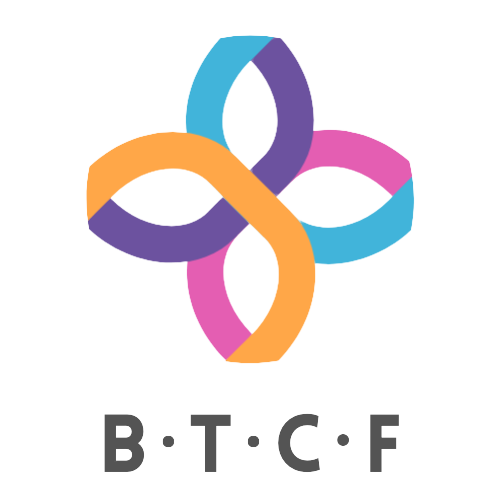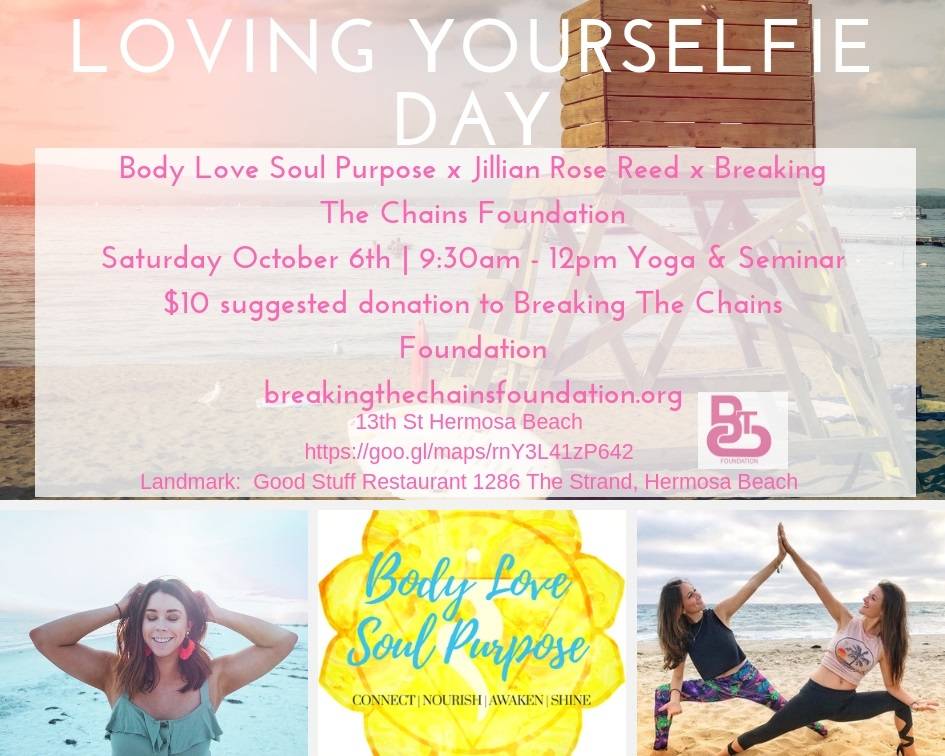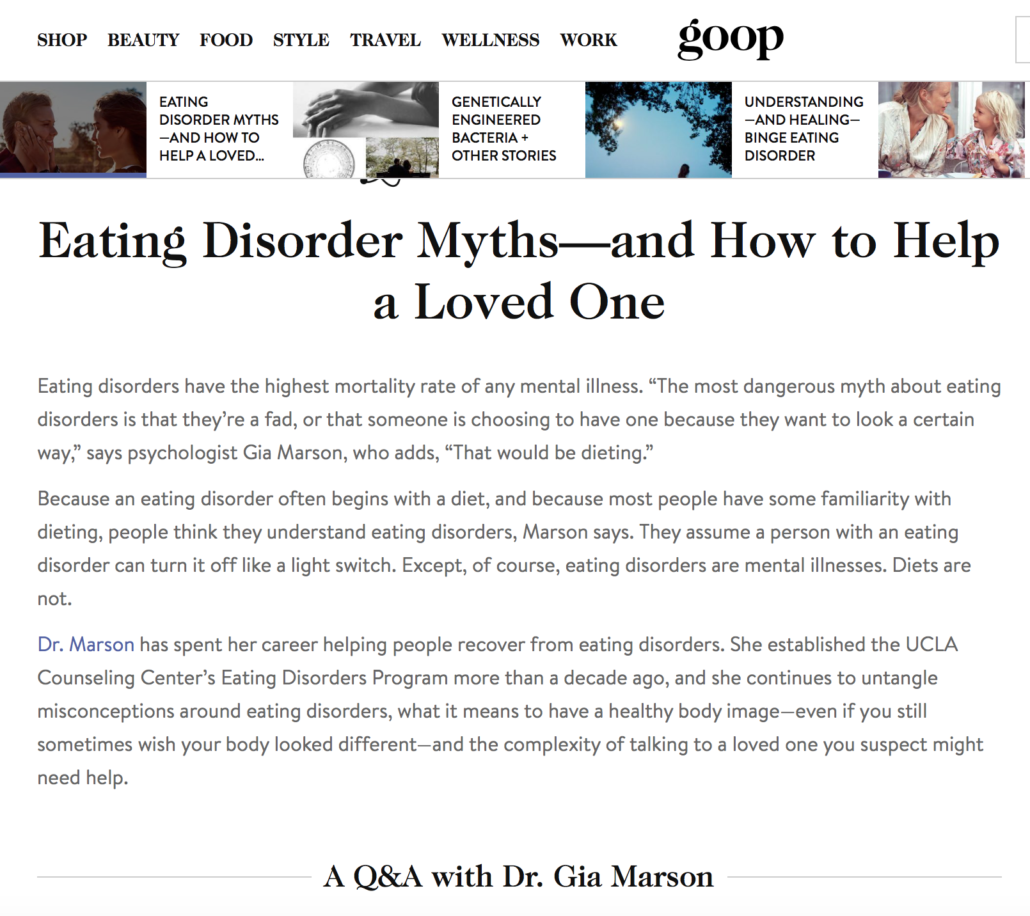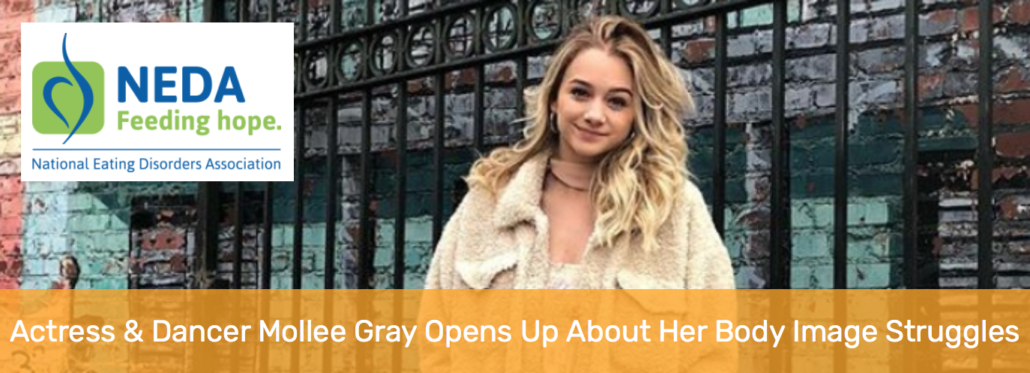OCTOBER 8TH
OCTOBER 13TH
BTCF Board Member Dr. Gia Marson talks with Goop about helping loved ones with an eating disorder.
Breaking the Chains and NEDA
Breaking the Chains Foundation partnered with NEDA in support of National Eating Disorder Awareness Week on February 26 – March 4th by promoting awareness via a variety of our social media networks, celebrity support, sharing NEDA’s screening tool through our social media platforms, as well as having our own online event through out the week. Also joined NEDA in forming our own team for the Los Angeles NEDA Walk on April 7th, walking and raising funds in support of stopping eating disorders.
GREAT NEWS
The award winning short film “FINDING ALICE” was an Official Selection both as a short film and written word in The Hollywood Dreamz International Film Festival and Writer’s Awards in Las Vegas, August 2017!
UPCOMING NEWS
STAY TUNED! – BTCF YOUNG HOLLYWOOD CAMPAIGN














Struggling with food? Don’t give up!
BlogStruggling with food? Don’t give up!
Written by Dr. Gia Marson
Advice from people who have fully recovered from binge eating, compulsive eating, and emotional eating
If you’ve tried diets and cleanses that haven’t worked, you’re not alone. Fad-based eating and restricting offers only false hope. Here is the truth: Binge eating disorder will impact 8 percent of American adults at some point in their lifetime, and approximately half of the risk for developing it is associated with genetics.
Binge eating disorder is three times more common than anorexia nervosa or bulimia nervosa. Yet, most people who are struggling with loss-of-control eating do not seek help due to shame.
To make matters worse, conversations about overcoming binge eating, emotional eating, mindless eating, and compulsive eating can exacerbate the isolation and hopelessness. At home, in gyms, and even at doctor’s offices, relief from binge eating is often all about weight loss instead of health, satisfying relationships, and happiness. These pseudo-scientific discussions may inadvertently increase shame and stigma, rather than increasing openness and healing. Against this backdrop is an ever-expanding diet industry that survives because failure is built into the system.
When we consider all of these factors, how can we spread messages of hope?
While binge eating disorder impacts nearly six million people, it also has very good recovery rates for those who seek out science-backed help. And the same effective tools can work for those who binge eat less frequently or eat mindlessly, compulsively, or emotionally.
If you are sitting on the fence about whether to give recovery a try, take a few minutes to read anonymous stories of hope from people who have fully recovered. Their stories were offered as a contribution to our book, The Binge Eating Prevention Workbook: An Eight-Week Individualized Program to Overcome Compulsive Eating and Make Peace with Food. Take a peek at the positive impact these individuals experienced when they changed their thoughts, emotions, personal relationships, food restrictions and rules, environment, and activities. And, best of all, their changes led to lasting recovery and a healthy relationship with food.
I am 37 years old and I did not stop binge eating until I was 35. Don’t waste as many years as I did being miserable. Trust yourself that you are worth being healthy. Look outside yourself and find a reason to change your life for the better. Find ways to get out of your head and listen to your gut. Find a way to be so in the moment that you can’t help but make choices that serve your strength. You deserve that.
The fight is hard. And there will be times when you lose. But it IS winnable.
I did not believe a total recovery was possible for me. My eating disorder was so much of who I was as a person that I couldn’t picture myself without it. But I made changes that I hated, and I kept making them. My confidence grew in my ability to break my rituals and be uncomfortable. In time, I found myself really wanting to change.
There are so many ways that relationships meet my needs now. But because people had let me down at some point, I didn’t trust them to meet my needs and instead used food. Being able to need things from others, whether they meet that need or not, has freed me of relying only on myself and food for support.
Are you in any way restricting? I thought I wasn’t. I didn’t think I had a problem with restriction. I truly didn’t. It wasn’t until I realized I had that mindset and then let go of all restrictions that I was actually able to stop the disorder.
When I first stopped compulsive eating, when I was almost recovered, I let myself be sad—maybe for the first time in my life. It was horrible and hard, and I thought I was going crazy because I didn’t even know why I was sad. Then, all of a sudden, the sadness went away. And this time, the eating disorder didn’t come back. I truly didn’t think I was hiding my feelings by having an eating disorder, but I must have been, because once I let myself have that terrible month of sadness, it all went away.
I am an elite athlete. I spend an incredible amount of time training and have dedicated my life to that. I had to finally get binge eating out of my life. I learned tools to manage the feelings I was numbing. I opened up to people: my boss, my team. It was TERRIFYING. The more I spoke about it, the stronger I became. The love and care of the people around me saved my life.
Changing my behaviors was the catalyst to recovery for me. Breaking my habits allowed me “normal” experiences that were more social than my private, isolated eating rituals. Sometimes the social aspect of “normal” eating made me uncomfortable, but it built my confidence that I could do it and be okay.
Learning that it was okay to feel all my emotions, express them, and have them witnessed in herald was life changing. Understanding the role that emotional eating played in my life and getting at the underlying issues beyond food and eating was crucial.
Develop self-empathy and compassion, just as you would for any child you meet. When you react with comments of self-hate and despair, learn understanding and compassion for that judgmental, lost warrior, one minute at a time.
It was a daily struggle to fight my eating rituals and maintain the behavior changes that I knew were good for me, but every success became a moment I could look to later to remind me of my strength. Eventually, I could go through the motions of healthy eating enough to believe that I could really sustain it.
If you are experiencing difficulty with binge eating, emotional eating, mindless eating, or compulsive eating—or you’re sliding back from your road of recovery—there is good reason to be optimistic.
When we began writing The Binge Eating Prevention Workbook, we were on a mission to be helpful. We wanted to offer a way out of food battles for anyone ready for change and for those contemplating it. Here is just some of what you’ll find: Our unique, step-by-step eight-week plan grounded in psychological science, with effective tools and practices to put them to use
An individualized self-help format that offers an opportunity to heal from home, because we understand it can be difficult to talk about food struggles in person
Strategies for how to cope well with emotions (including anxiety, sadness, stress and anger)
A nonjudgmental approach that spreads compassion, since the research shows that most people get better when they apply what works
Some honest, inspiring advice from people who have fully recovered from their eating disorders—we call them “experts by experience”
Whether you buy our book, join the intentional eating community, or reach out for in-person help from a dietitian or therapist, I hope these personal stories of success plant the seed of change. A new way of eating is possible for you. When you’re ready, choose your strategy and begin the journey out of panic with food and into peace.
Hudson, J. I., Hiripi, E., Pope, H. G., & Kessler, R. C. (2007). The prevalence and correlates of eating disorders in the national comorbidity survey replication. Biological Psychiatry, 61(3): 348–358.
Ulfvebrand, S., Birgegard, A., Norring, C., Hogdahl, L., & von Hausswolff-Juhlin, Y. (2015). Psychiatric comorbidity in women and men with eating disorders results from a large clinical database. Psychiatry Research, 230(2): 294–299.
Wansink, B. (2016). Mindless eating: Why we eat more than we think. National Institutes of Health Office of Behavioral and Social Science Research March 10, https://obssr.od.nih.gov/mindless-eating-eat-think/.
Finding Joy In Movement
Health & Wellness ConversationsFinding Joy In Movement
By Krista Stryker
NSCA-CPT, Precision Nutrition Certified Coach
I first started exercising regularly in my early twenties. Like most people beginning an exercise habit, I wanted to feel better in my body and change how I looked. At the time, I dreaded my workouts. I didn’t know much about exercise and thought running was the only way to get in shape. I’ve never liked to run, so of course, I did everything I could to avoid my workouts.
Over time, I found other ways to build movement into my daily life — activities that resonated much more with me than running. I fell in love with the intensity of HIIT workouts, found a circus coach to teach me handstands, learned to box, and took up martial arts. And while I began my fitness journey mainly intending to change my appearance, what I’ve gotten from it has been so much more than that. Movement has helped me find meaning and purpose, helped me build confidence and learn to believe in myself, and has brought me a tremendous amount of joy over the years.
I believe that movement can do the same for all of us.
In her book, The Joy of Movement: How Exercise Helps Us Find Happiness, Hope, Connection, and Courage, Stanford psychologist and dedicated group fitness instructor writes that exercise is integral to both our happiness and our humanity:
“People who are regularly active have a stronger sense of purpose, and they experience more gratitude, love, and hope. They feel more connected to their communities, and are less likely to suffer from loneliness or become depressed.”
Movement is deeply ingrained into who we are as humans. But if you haven’t found your “thing” when it comes to physical activity yet, keep experimenting.
One strategy for doing this is to think about the activities you loved doing as a kid. Did you gravitate toward playgrounds and trampoline parks? Try some adult gymnastics classes. Did you love team sports? Adult club sport opportunities are everywhere these days. Get your friends to join you or make new friends who enjoy being active.
We’re extremely lucky to live in a time where opportunities for adult learning are in abundance. You can find adult classes in dance, gymnastics, and martial arts. You can learn to surf, skateboard, or learn aerial silks. You can find local hiking trails, rent a stand-up paddleboard, or any variety of yoga classes. If you can’t find something you’re interested in nearby, check out online learning opportunities.
As McGonigal writes,
“Movement offers us pleasure, identity, belonging and hope. It puts us in places that are good for us, whether that’s outdoors in nature, in an environment that challenges us, or with a supportive community. It allows us to redefine ourselves and reimagine what is possible. It makes social connection easier and self-transcendence possible.”
Movement has been an enormous source of joy in my life. I believe it can do the same for you, too, no matter where you’re at in your journey.
About Krista Stryker
From trying her first push-up in college, to teaching herself to do pull-ups and handstands, Krista is living proof of her philosophy that everybody is an athlete. She is passionate about helping others become stronger inside and out through the intersection of mental and physical fitness. Krista regularly writes on well-being, healthy living, positive psychology, and high performance.
Krista has been featured in The New York Post, The Washington Post, SHAPE Magazine, Train Magazine, Muscle & Fitness HERS, and on ESPN and Mindbodygreen, among many others. She is also a faculty member at the Center for the Science of Human Potential where she teaches for Transcend, the online course teaching the latest science of positive psychology and self-actualization taught by Scott Barry Kaufman.
August’s Recipe Guacamole & Shrimp Toast Points
Canvas of Culinary ArtsINGREDIENTS
Pico de Gallo
INSTRUCTIONS